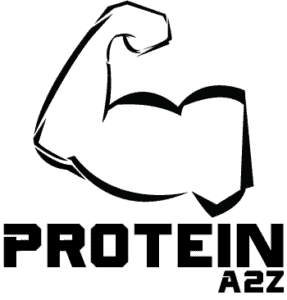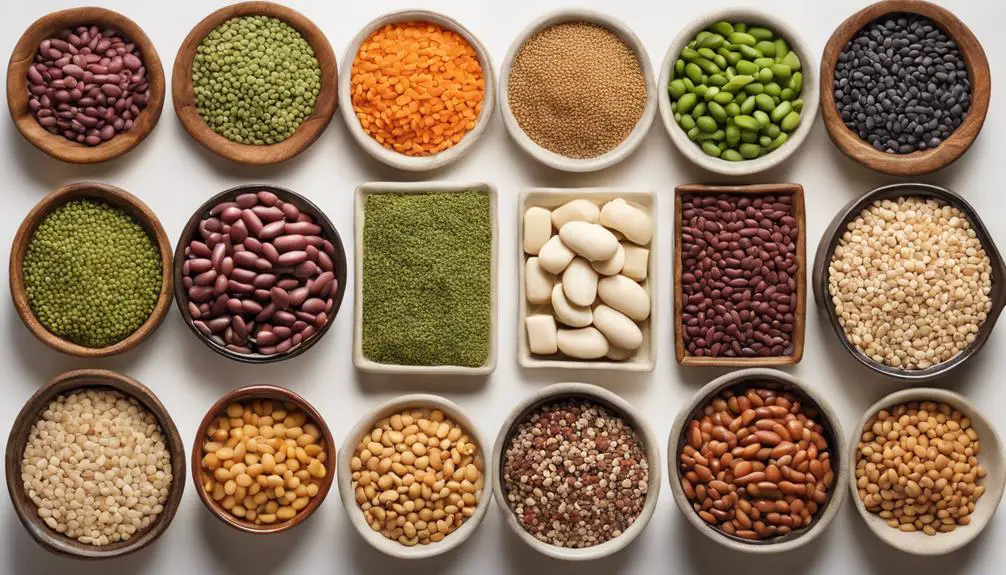Uncover essential steps for vegetarians to reach their protein needs, ensuring a balanced diet and optimal health - discover the key to plant-based protein
To guarantee you meet your daily protein needs as a vegetarian, focus on incorporating a variety of plant-based protein sources, such as legumes, tofu, tempeh, and nuts, which are rich in essential amino acids vital for overall health. Aim for around 0.36 grams of protein per pound of body weight per day, and consider pairing complementary proteins like legumes, nuts, and seeds to make certain you get all the necessary amino acids. Including a diverse range of plant-based foods, spreading protein intake throughout the day, and staying hydrated are key factors in optimizing protein utilization.
By experimenting with protein-rich recipes, exploring snack options, and seeking professional guidance if necessary, you can successfully maintain adequate protein levels for your vegetarian diet.
Table of Contents
Key Takeaways
- Include a variety of plant-based protein sources in your diet.
- Combine complementary proteins like legumes and grains for essential amino acids.
- Opt for fortified foods or plant-based protein powders if needed.
- Stay hydrated with at least 8-10 glasses of water daily for optimal protein utilization.
- Consult a registered dietitian for personalized advice on meeting protein needs.
Understanding Protein Requirements
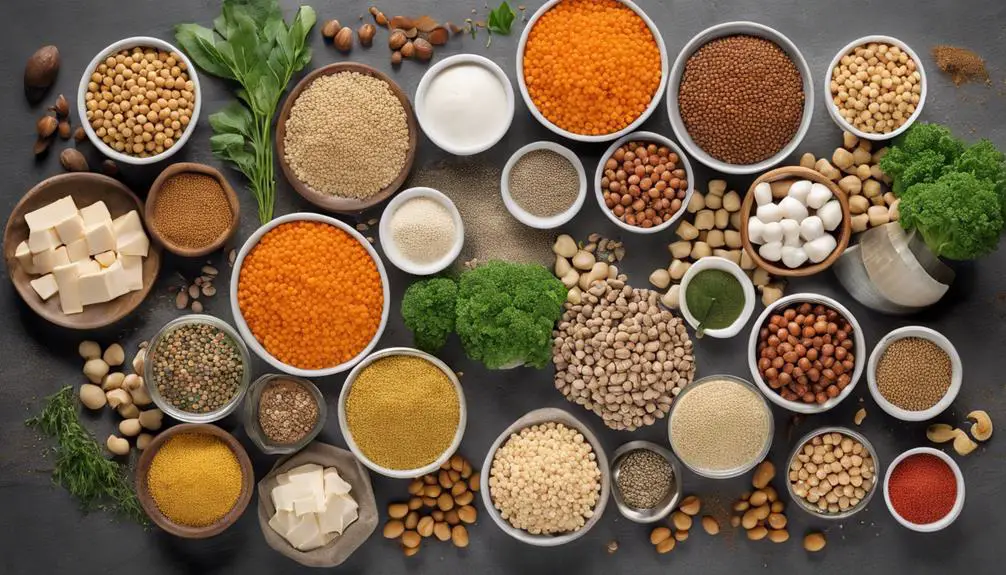
Understanding the protein requirements for vegetarians is vital for guaranteeing you meet your daily protein needs. As a vegetarian, it's essential to pay attention to consuming an adequate amount of protein for overall health and well-being.
Plant-based sources such as legumes, tofu, tempeh, and nuts play a significant role in providing the necessary protein for your diet. To make sure you're getting the proper levels of protein, aim for around 0.36 grams of protein per pound of body weight daily.
Incorporating Variety of Plant-Based Proteins
To ensure a well-rounded vegetarian diet abundant in essential nutrients, incorporating a variety of plant-based proteins like legumes, tofu, tempeh, and seitan is crucial. These sources offer a diverse range of amino acids necessary for your body's functions.
- Legumes: Beans, lentils, and chickpeas are excellent sources of plant-based protein. They're versatile and can be integrated into various dishes like soups, salads, and stews.
- Tofu and Tempeh: These soy-based products are rich in protein and can be marinated, grilled, or stir-fried to add a meaty texture to your meals.
- Grains, Nuts, and Seeds: Quinoa, chia seeds, almonds, and pumpkin seeds are great additions to your diet as they provide not only protein but also essential fatty acids and micronutrients.
Balancing Essential Amino Acids
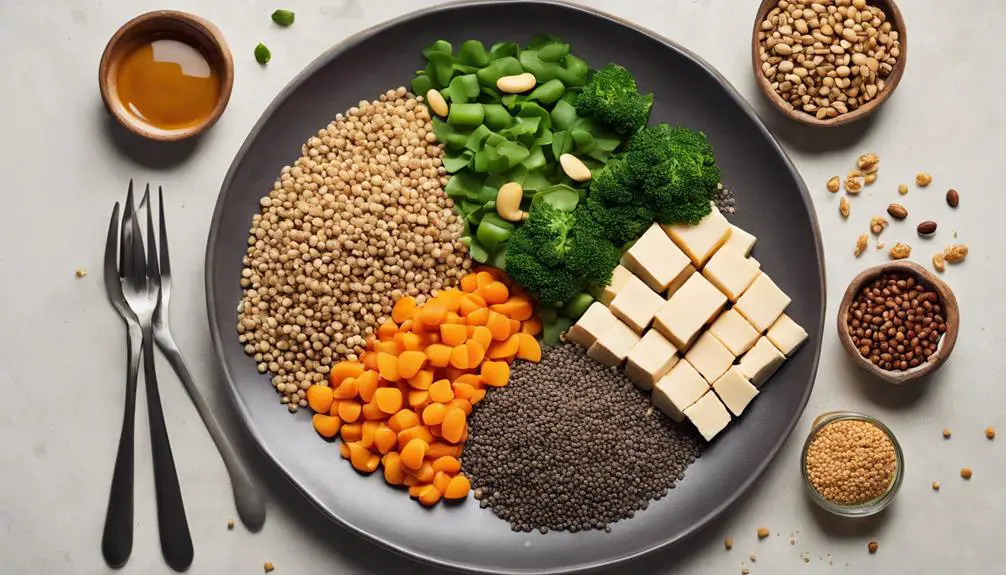
To achieve optimal protein levels as a vegetarian, it's essential to grasp the significance of essential amino acids.
By combining a variety of plant-based protein sources, you can guarantee you're receiving all the necessary amino acids your body needs to function properly.
Balancing different protein-rich foods like legumes, grains, nuts, and seeds can assist you in creating complete proteins and meeting your dietary requirements.
Amino Acid Importance
Balancing essential amino acids in your diet is important for maximizing protein utilization and supporting overall health. When focusing on amino acid significance, consider the following:
- Essential amino acids are crucial for various bodily functions and must be obtained through your diet.
- Plant-based sources like legumes, nuts, and seeds offer a variety of essential amino acids necessary for your body.
- Complementary protein combinations can help you make sure you're getting all the essential amino acids required for muscle growth, repair, and overall protein synthesis.
Protein Source Variety
For optimal protein intake as a vegetarian, incorporating a diverse range of plant-based sources such as legumes, tofu, tempeh, seitan, and edamame is crucial. These foods offer a variety of amino acids necessary for a balanced diet. Pairing complementary proteins like rice and beans or hummus with whole grain pita guarantees you receive all essential amino acids. Consider fortified foods or plant-based protein powders if needed. Here's a table showcasing the protein content of common vegetarian sources:
| Protein Source | Protein Content per 100g |
|---|---|
| Lentils | 9g |
| Tofu | 8g |
| Quinoa | 4g |
Diversifying your protein sources not only enhances your nutrient intake but also makes your meals exciting and satisfying.
Meal Planning for Protein Adequacy
When planning your meals for the best protein intake as a vegetarian, make sure to include a quality protein source at each meal such as eggs, dairy, beans, lentils, nuts, or seeds. Opt for high-protein vegetarian foods like tempeh, edamame, and Ezekiel bread to increase your protein intake throughout the day. Additionally, experimenting with lesser-known protein sources such as quinoa, amaranth, spirulina, and nutritional yeast can add variety and essential amino acids to your diet.
Incorporate Greek yogurt, milk, and cheese into your meals for added protein content.
Try adding nuts, seeds, beans, lentils, tofu, tempeh, and edamame to different dishes to ensure a balanced meal planning with sufficient protein intake.
Consider using a variety of protein sources to not only meet your protein requirements but also to enjoy a diverse and flavorful vegetarian diet.
Experimenting With Protein-Rich Recipes
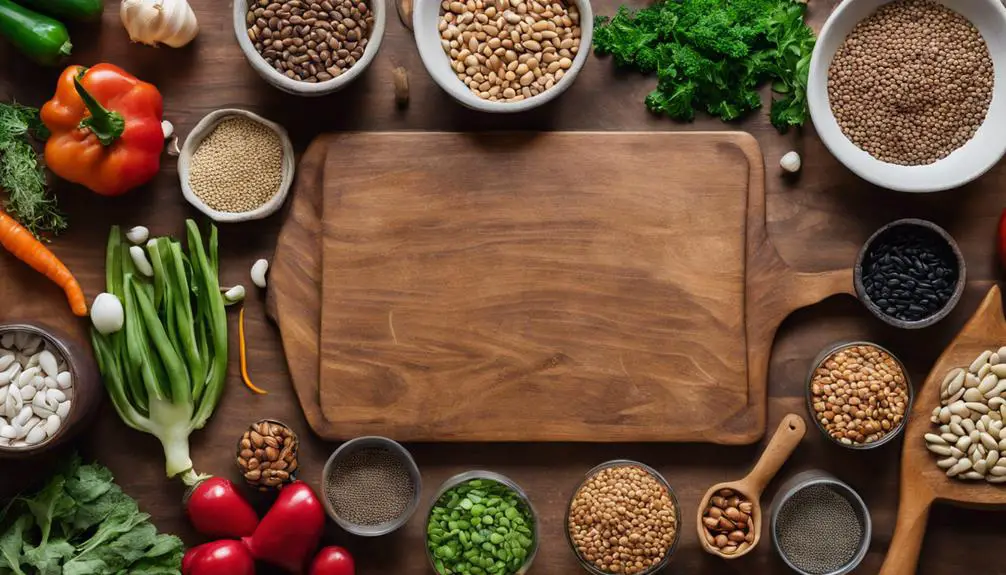
To enhance your vegetarian diet with a variety of protein-rich options, consider exploring new recipes that incorporate plant-based protein sources for maximum nutrition. Immerse yourself in the world of lentil curry or black bean tacos to infuse your meals with plant-based protein goodness. Delight your taste buds with a flavorful tofu stir-fry packed with colorful veggies and a delectable sesame ginger sauce. For a nutritious breakfast or snack, try your hand at making chia seed pudding, a dish rich in protein and omega-3 fatty acids. Additionally, whip up a protein-rich smoothie using spinach, banana, protein powder, and almond milk for a quick and satisfying meal or snack.
| Protein-Rich Recipes | Ingredients | Benefits |
|---|---|---|
| High-Protein Quinoa Salad | Quinoa, chickpeas, nuts, lemon vinaigrette | Rich in protein and fiber |
| Tofu Stir-Fry | Tofu, vegetables, sesame ginger sauce | High protein content, delicious flavors |
| Chia Seed Pudding | Chia seeds, almond milk, fruits | Protein-packed, omega-3 fatty acids |
Monitoring Protein Intake
To guarantee you're meeting your protein needs, concentrate on consuming a variety of protein sources such as nuts, seeds, beans, and tofu.
Keep track of your daily protein intake to ensure you're reaching the recommended amount based on your body weight.
Additionally, regularly evaluate your overall nutrient intake to maintain a balanced diet that supports your protein requirements.
Protein Sources Variety
Including a variety of protein sources in your vegetarian diet is crucial for monitoring and maintaining proper protein intake levels. To make sure you're getting a diverse range of plant-based proteins, consider incorporating the following:
- Legumes: Beans, lentils, and chickpeas are excellent sources of protein.
- Tofu: A versatile protein source that can be used in various dishes.
- Tempeh: Made from fermented soybeans, tempeh is a nutritious protein option.
Daily Intake Tracking
For excellent vegetarian protein intake, monitoring your daily protein levels is essential to ensure you meet your recommended requirements. Keeping track of the protein content in your meals and snacks is vital for maintaining a balanced diet. Aim for around 0.36 grams of protein per pound of body weight daily and spread your protein intake throughout the day for better utilization by the body. If needed, consider using plant-based protein supplements like pea or soy powder to meet your protein requirements effectively. Below is a table to help you monitor your daily protein intake:
| Protein Source | Protein Content per Serving | Recommended Daily Amount |
|---|---|---|
| Lentils | 18g | 100g |
| Tofu | 10g | 85g |
| Quinoa | 8g | 50g |
| Almonds | 6g | 30g |
Nutrient Balance Check
Monitoring your daily protein intake is essential to maintaining a balanced diet and ensuring you meet your recommended requirements for proper nutrient balance. To keep track effectively, aim for 0.36 grams of protein per pound of body weight daily.
Spread out your protein consumption throughout the day to optimize utilization by the body. Additionally, consider incorporating sprouted whole grain breads into your meals as they can offer added protein.
To enhance your protein intake, add protein-rich foods like salads, bowls, roasted veggies, pasta dishes, and soups. Should you find it challenging to meet your protein needs through food sources alone, plant-based protein supplements such as pea or soy powder can be beneficial for a balanced vegetarian diet.
Supplementing Wisely, if Needed
If you find it challenging to meet your daily protein needs through whole foods alone, consider incorporating plant-based protein supplements like pea or soy powder to support your intake.
Plant-based protein supplements can be a convenient way to boost your protein levels, especially for vegetarians. To guarantee proper protein intake, aim for around 0.36 grams of protein per pound of body weight each day.
Spreading your protein intake throughout the day can also enhance its utilization by your body. Additionally, incorporating sprouted whole grain breads into your diet can provide an added protein source.
You can also add protein to various meals like salads, bowls, and soups to help meet your daily protein requirements. Remember, supplementing wisely, if needed, can be a practical approach to ensure you're getting adequate protein as a vegetarian.
Hydrating for Optimal Protein Utilization
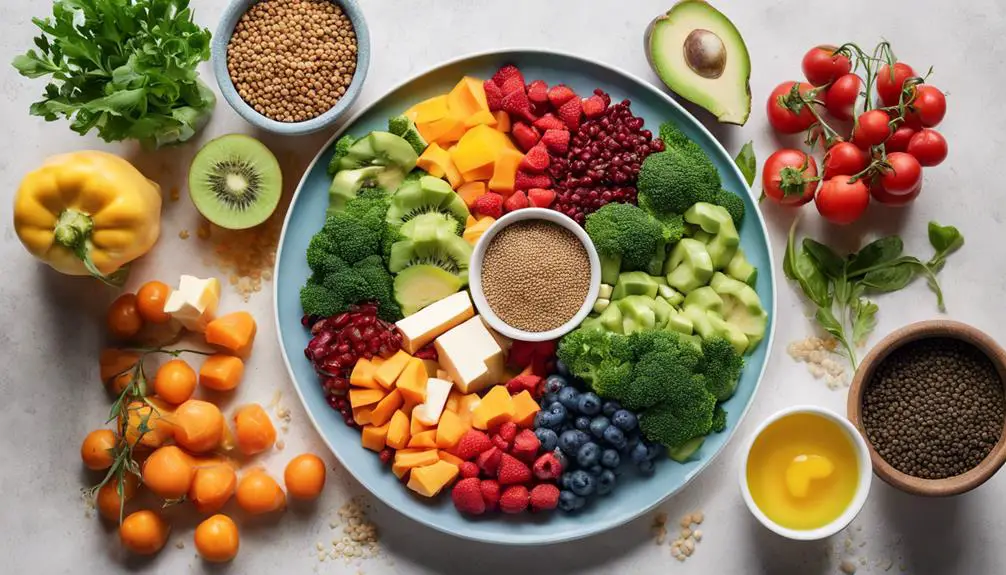
Proper hydration plays a significant role in facilitating excellent protein utilization within the body. When following a vegetarian diet, ensuring sufficient water intake is essential for ideal nutrient transport and muscle recovery.
Here are some key points to keep in mind:
- Hydration and Protein Utilization: Water assists in transporting nutrients, such as proteins, to cells for growth and repair.
- Water Intake Recommendations: Aim to drink at least 8-10 glasses of water daily to support protein utilization and overall hydration levels.
- Muscle Recovery and Hydration: Dehydration can hinder protein synthesis and impede muscle recovery post-exercise.
Considering Protein Complementation
To optimize your protein intake as a vegetarian, consider the concept of protein complementation by combining various plant-based sources rich in essential amino acids. Protein complementation involves pairing different plant-based protein sources to guarantee you receive all essential amino acids necessary for your body.
By combining foods like legumes, grains, nuts, and seeds, you can enhance the overall quality of your protein intake. For example, creating meals with combinations such as rice and beans or hummus and whole grain pita can provide you with complete proteins.
This practice is essential for vegetarians to meet their daily protein requirements and support overall health. By incorporating a variety of complementary protein sources into your meals, you can assure you're achieving a balanced and nutritious vegetarian diet that supports your well-being.
Exploring Protein-Rich Snack Options
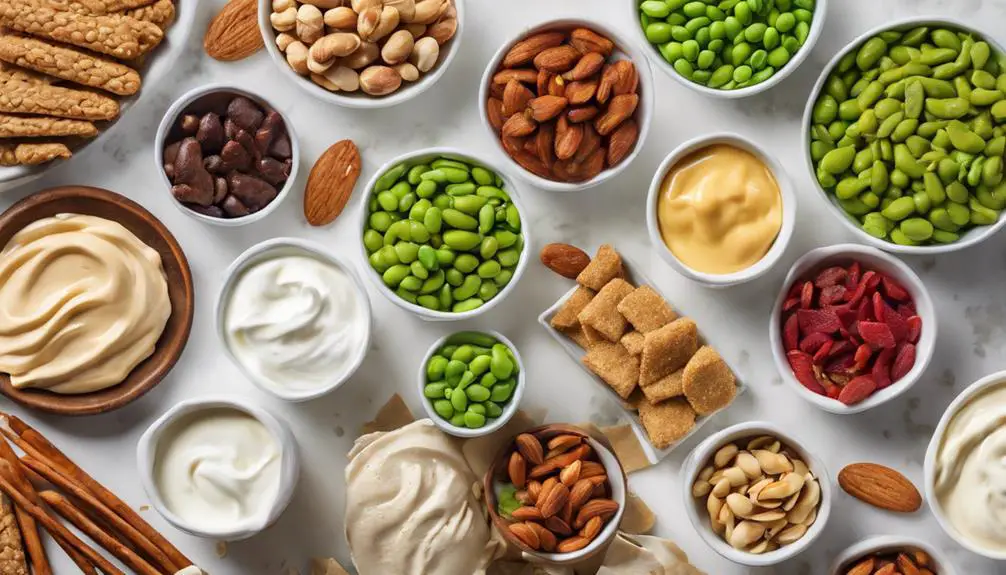
When looking for protein-rich snack options, consider hummus with veggies for a combination of protein and fiber.
Greek yogurt with fruit is a quick and tasty protein boost.
Rice cakes with almond butter are a satisfying and nutritious snack.
Trail mix and roasted chickpeas are also great choices to support energy levels and provide essential nutrients for vegetarians.
Incorporating these snacks into your diet can help you meet your daily protein needs, maintain muscle health, and enhance overall well-being.
Snack Ideas for Protein
For a satisfying and protein-packed snack option, consider incorporating hummus and veggies into your daily routine. Hummus not only provides a good source of protein but also offers fiber and essential nutrients.
Here are some more protein-rich snack ideas to keep you energized throughout the day:
- Greek yogurt with fruit: A delicious and balanced snack that combines protein with vitamins and minerals.
- Rice cakes with almond butter: A tasty and convenient way to add protein to your snacking.
- Trail mix with nuts and seeds: A portable and protein-filled option for on-the-go munching.
These snacks not only taste great but also help you meet your protein needs in a healthy and satisfying way.
Quick and Easy Options
Consider incorporating a variety of protein-rich snacks into your daily routine to guarantee you meet your nutritional needs and sustain energy levels throughout the day. Some quick and simple options for protein-rich snacks on a vegetarian diet include hummus and veggies, Greek yogurt with fruit, rice cakes with almond butter, trail mix, and roasted chickpeas. These snacks not only provide essential nutrients like protein, fiber, vitamins, and minerals but also support muscle repair, energy levels, and weight management. By snacking on these options, you can prevent overeating during main meals and make sure you have the necessary fuel for your day. Here is a table showcasing some convenient and delicious protein-rich snack choices:
| Protein-Packed Snack Options | Benefits |
|---|---|
| Hummus and veggies | Protein, fiber, and vitamins |
| Greek yogurt with fruit | Protein, probiotics, and vitamins |
| Rice cakes with almond butter | Protein, healthy fats, and energy |
Seeking Professional Guidance, if Necessary
To guarantee adequate protein intake as a vegetarian, seeking guidance from a registered dietitian can provide personalized advice tailored to your dietary needs and preferences. Registered healthcare professionals can offer valuable insights into optimizing protein intake on a plant-based diet while maintaining overall health. Here are some key benefits of seeking professional guidance:
- Tailored Recommendations: A dietitian can customize recommendations based on your specific protein requirements and food preferences.
- Plant-Based Protein Sources: Healthcare providers can suggest a variety of plant-based protein sources to assure a balanced diet.
- Supplement Suggestions: When necessary, professionals can recommend suitable supplements to support your protein intake.
Guidance from a healthcare provider ensures that as a vegetarian, you can make informed decisions regarding your protein intake, supporting your overall health and well-being. Professional advice can be instrumental in helping you navigate the nuances of a plant-based diet to meet your nutritional needs effectively.
Tracking Progress and Adjusting as Needed
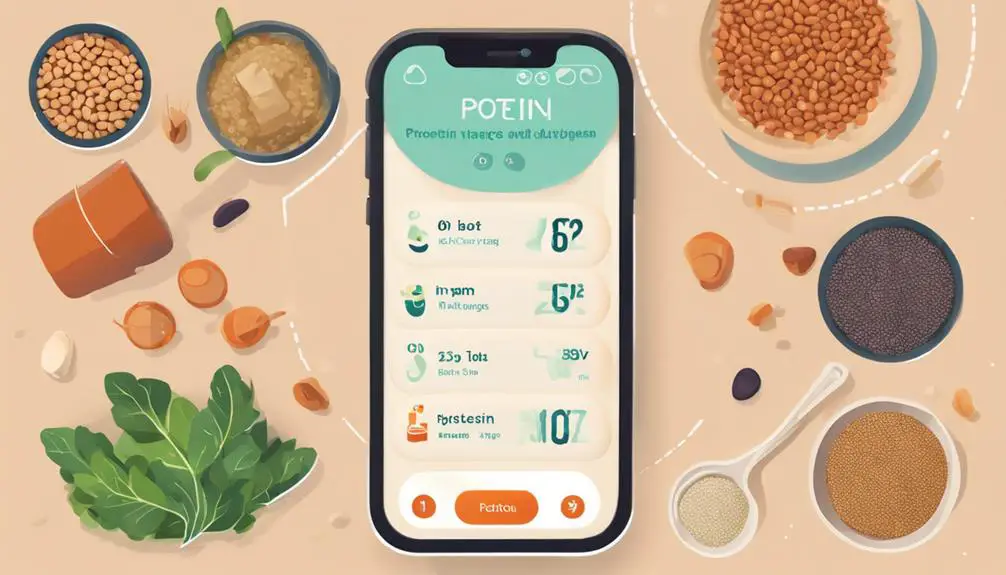
If you aim to maintain peak protein levels as a vegetarian, it's essential to regularly monitor your protein intake levels and make adjustments based on various factors such as activity levels, age, and dietary requirements.
Tracking progress is vital to make sure that you're meeting your body's needs. By noting changes in energy levels, muscle growth, and overall well-being, you can assess if your current protein intake is sufficient.
If you find it challenging to track progress on your own, consider consulting a nutritionist or dietitian who can provide personalized recommendations based on your specific requirements. These professionals can help you in adjusting protein intake to match your lifestyle and health goals.
Be prepared to modify your protein sources or quantities as needed for best health outcomes. Remember, staying proactive in monitoring and adjusting your protein intake will help you maintain a balanced and nutritious vegetarian diet.
Frequently Asked Questions
How Can a Vegetarian Ensure They Get Enough Protein?
To get enough protein as a vegetarian, focus on consuming a variety of plant-based sources like legumes, tofu, and nuts. Combining different proteins guarantees you receive essential amino acids. Fortified foods or supplements can help if needed.
What Steps Should Vegetarians Take to Ensure They Get Proper Levels of Protein Brainly?
To guarantee you get proper protein levels, concentrate on incorporating diverse plant-based sources like beans, lentils, nuts, and seeds into your meals. Consider high-protein options like tempeh and quinoa while enjoying dairy products and experimenting with different protein-rich foods.
How Do Vegetarians Fulfill Daily Protein Requirements?
To meet daily protein requirements as a vegetarian, incorporate plant-based protein sources in your meals, such as legumes, tofu, tempeh, and nuts. Maintain a balanced diet with a variety of proteins to meet your needs while enjoying delicious, nutritious meals.
What Are the Rules to Follow When Balancing Protein for Vegetarians?
To balance protein intake as a vegetarian, focus on diverse plant-based sources like legumes, tofu, and nuts. Complement proteins by combining different sources. Consider fortified foods or supplements if needed. Aim for variety in your diet for best nutrition.
Conclusion
To sum up, by following these 12 steps, vegetarians can guarantee they're meeting their protein needs through a variety of plant-based sources. With a focus on balance, planning, and experimentation, vegetarians can enjoy a diverse and nutritious diet that supports their health and well-being.
Remember to seek professional guidance if needed, track progress, and make adjustments as necessary to optimize protein intake and overall nutrition. With these steps, vegetarians can thrive on a plant-based diet rich in protein.
